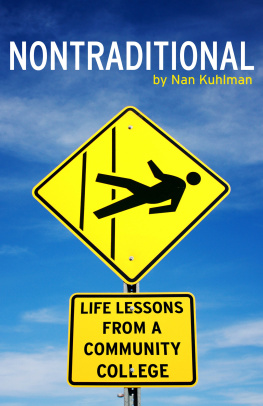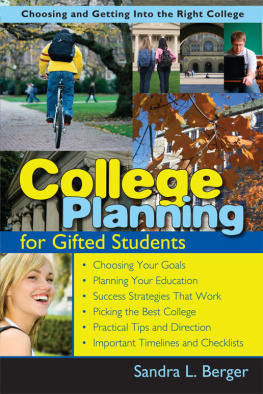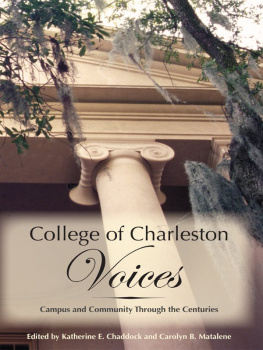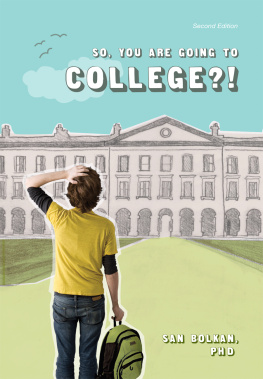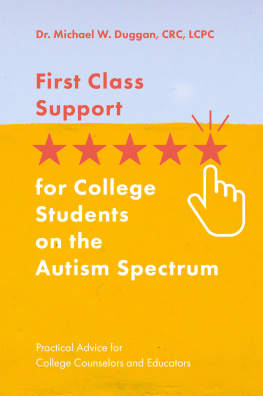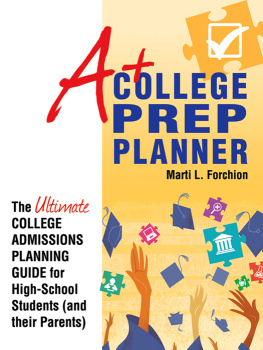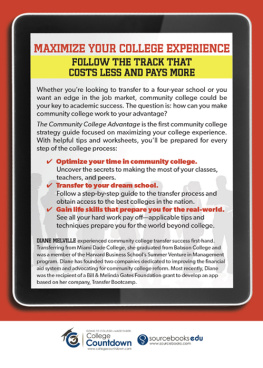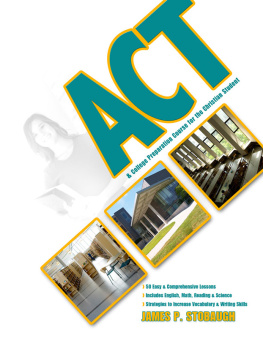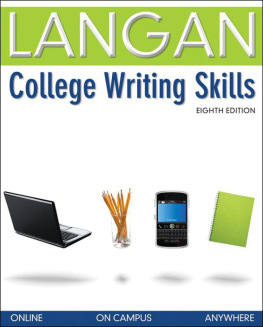Contents
Nontraditional
Life Lessons from a Community College
Nan Kuhlman

Dedication
To my husband Craig who has made my life an adventure
Prologue
The topic of our class discussion was deadbeat dads, spurred by the reading of John Cheevers Reunion, a short essay about a boys disappointment with his estranged father. The students in my class jumped at the chance to point out the fathers missteps: his drinking, his belligerent treatment of those he considers beneath his social status, his obvious showing off to impress his son. I asked them to talk about examples that Cheever uses to illustrate, and in the course of the discussion, one student said, That was my dad. He acted just like that. Others concurred that they experienced similar deadbeat dads, and how they hoped for a better relationship but never saw it happen.
Then one older student, a graying former Marine, said, Well, I see this story differently. I see a father who desperately wants to connect with his son, but whos probably nervous. This son may not have seen his father for three years, but the story doesnt tell us if the mother kept the child away from him. I see the son judging the father and creating the division, and the father is trying to win him back.
At that moment, the class shifted; the perspective had been enlarged. We realized intuitively that this former Marine had been in the fathers shoes, and I asked the class, Why did most of us side with the son in our discussion? What technique does Cheever use to make most of us feel that way? The students nodded in agreement, murmuring The first-person point of view and seeing with new eyes how an authors use of a literary technique can sway readers. More importantly, the class recognized its own bias, the crazy way our minds tell us how the world is. It was moments like this one that made me slog through stacks of grading because I got to witness this expansion as students broke free of negative thought patterns and traditional mindsets into a nontraditional way of thinking.
The term nontraditional is often used in academia to describe students who are not the typical college student, a recent high school graduate with college prep experience. Community colleges like the one where I teach typically have an open enrollment policy that welcomes all who wish to learn. Our college has veterans who are taking advantage of the GI bill now their tour of duty is completed; some of them, like Jared, are wrestling with the demons from PTSD. Many of our students qualify for Pell Grants and other types of financial aid, despite the fact that the tuition is only around $3500 a year for fall and spring semesters. A number of them, like Norma, struggle to feed and house their families. Often they are working one or two part-time jobs along with raising children. Sometimes they are dislocated factory workers, like Margie and Shari, hoping to retrain for another job. The age of the students ranges from younger than fifteen (high school students taking college courses for dual credits) to nearly sixty. This student body is nontraditional in the fullest sense of the word, and so is at least one of the instructors.
Nontraditional also described my entrance into academic work. Homeschooling our three children was my first priority, my freelance magazine writing for a couple of local magazines was my second, and far off in the future was the dream of a masters degree and teaching at a college. One evening I was attending a business presentation for my husbands firm (a spousal obligation), listening to an economist make predictions about the stock market and wondering if the caterer would be serving those delicious stuffed mushrooms and bacon-wrapped water chestnuts. As we mixed and mingled with business clients, enjoying hors doeuvres after the presentation, my husband introduced me to the president of a rural community college nearby. Were always looking for adjunct instructors, especially for composition, he told me.
But I dont have a masters degree, I stammered.
He reassured me, We have ways around that for people who have work experience. Why dont you email your resum to the dean of Arts and Sciences and tell her you spoke with me?
The students come to the college, just like I did, looking for second chances, somewhat wounded and in need of healing. These stories are true, though the names have been changed and some of the details are combined to provide anonymity. We are all nontraditional, and were hoping that this place of higher learning might teach us how to think outside the boundaries that we place on ourselves and others.
Chapter 1: Who Do You Think You Are?
Fortunetellers and Futures
Like any other eighteen-year-old, I wasnt sure what I wanted to be when I grew up. I toyed with the idea of the theater, having enjoyed my high school plays and musicals, and I suggested to my parents that I could go to New York in the company of a somewhat effeminate male classmate who was also interested in theater to give off-Broadway a try. That was shot down faster than the skeet my cousins used for target practice in the field behind our house. You need to be able to get a real job, my mother counseled as she lassoed my youthful optimism and brought it back to northwestern Ohio earth.
I looked through college majors and landed on this one: Radio, TV, Film. It sounded like it would be interesting, and it might allow me to work in front of a camera, which pleased my youthful narcissism. My parents approved reluctantly, and I set off to learn about the world of the media, which even in the 1980s was changing wildly.
My first media class was a standard overview of the way television stations worked, outlining all the sleep-inducing regulations by the Federal Communications Commission. But the professor said something interesting, something that my girlfriends and I could not fathom: that the newly developed cable TV would provide endless channels of programming and that programming would be very specific to a particular demographic. We had grown up with three channels (four if you counted PBS) that represented the three major networks: CBS, NBC, and ABC. My professor told us about the potential of cable and how this would allow advertisers to target their audience better and how it would give the audience more viewing options. He prophesied about having hundreds of channels, and our eyes almost rolled back in our heads, just contemplating all the content we would have to choose from. This would be too good to be true. Our viewing options wouldnt be restricted to General Hospital or Dynasty; we would be empowered with choices. This would be particularly important if the university wasnt running its Free Friday Movie Night or if there werent other campus activities going on.
For those of us not involved in Greek life, campus activities put on by the student body organization helped alleviate the boredom that often accompanied a keg of low beer and hints of a party. Our dorm hosted a Halloween party like this, and I had rented a costume from the campus theater. It was a tavern wench costume, or as I called it, a sexy peasant dress, with a deeply-scooped neckline, tightly-fitted bodice, puffy sleeves, and long full skirt. Though I lacked the bosom to fill it out to its best capacity, my roommate still said I looked scrumptious.
We made our way down to the dorm common space, a large room with great windows and a piano that had an A in the lower treble octave that tended to stick when played. No one was making music on the piano now; instead, Freddie Mercury was singing about biting the dust and AC/DC was on a personal highway to hell. My roommate, clad in her fathers Army dress uniform from the Korean War, led the charge as we snaked our way through the mass of gyrating bodies, finally landing in a secure spot on the fringes. As we sang along with Blondies Call Me, I felt a tap on my shoulder, and I turned around to face a girl named Sarah who lived on my floor. Her eyes were red and mascara-streaked her cheeks. She spat out the slurred words, Stay away from him, or so help me God, Ill beat you to a pulp.

